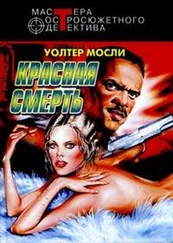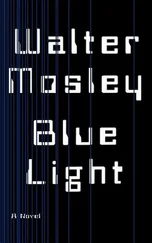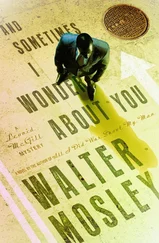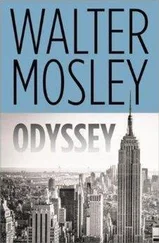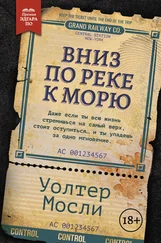Herman’s parents were dead. His sister, Winona, came to the wedding and Lucia’s best friend Timothy Michaels gave her away. France was Herman’s best man. Lucia was pregnant and Jimmy Grimaldi had been jailed because of an anonymous tip about his involvement in a burglary at the beginning of the year. It seemed that he decided to keep one of the rings he’d lifted from the fat banker who had recently bought a condo just north of Little Italy.
That week was a festival of great Russian silent movies. The first one Cornelius showed was Battleship Potemkin — his father’s favorite. CC sat in the small booth imagining his mother kissing Herman’s neck. With the door closed and locked, under the flickering light of the ancient projector, Cornelius felt somehow safe in the presence of the sacred images of his mother’s escape into the arms of his father.
After the fourth film the Arbuckle closed. France went home and Cornelius pulled out the thin mattress Herman kept behind the bookcase door. CC rolled the bed out and curled up under the same suspended flashlight his father had been reading by when Lucia ran in.
Cornelius reread The Painted Bird, imagining himself as that boy running in the wilderness, alone and forgotten among the crazy peoples of a lost world.
Four weeks later France Bickman and Cornelius helped Herman up the stairs and into bed, where he spent most of the rest of his life. The doctors didn’t know why he was so weak but they advised the older Jones to consider retirement.
From then on Cornelius went to school during the day and showed films at night.
Only France knew about the labor deceit and he had no reason to tell Lorraine. Lucia came over on the second Tuesday after Herman returned to make dinner and clean up. When she was ready to leave she stuck her head into Herman’s room and said that she’d be back on Friday to cook and clean again.
“Why do you want to come here now that I am sick and confined to my bed?” Herman asked her.
“Because you need my help,” she responded sensibly. Her loose summer dress was awash in the colors of the rainbow. Just to look at Lucia made CC smile.
“I needed your help when my legs worked and my lungs had the capacity for laughter,” he complained. “Why would I need a wife to see me suffer like this?”
“You’re an ungrateful man, Herman Jones,” Lucia told Cornelius’s father.
“Get the hell out of my house,” he replied, shocking both mother and son with his language and rage.
“Why is he so angry with me?” Lucia asked her son the next day. They were having tea at Uno in the break between school and when CC had to go to work.
“Because you left him when he was healthy and in love with you then came back when he’s sick and sad.”
“But isn’t that when he needs me most?” she asked innocently. “When he’s sick and bedridden?”
“I don’t think so, mama. When you’re sick who cares about how clean the house is or if somebody’s in the kitchen making meatballs and pasta? Dad can’t even eat your spicy sauce anymore.”
Though the boy didn’t know it he used language that got through to his mother. She folded in on herself, placing her head on the yellow-and-green Formica tabletop.
After that day Lucia Napoli-Jones worked full-time at Household Insurance. With the extra money she hired Violet Breen as a two day a week housekeeper for Herman and Cornelius.
The heavyset, middle-aged Irish maid and Herman hit it off almost immediately. Among other things Herman had committed to memory thousands of poems, many of them by Irish authors. He recited these to Violet whenever she brought him soup or lingered in his room dusting and tidying.
“He’s a treasure, your father,” she’d tell Cornelius. “And you are as good a son as any man or woman has ever known.”
Cornelius liked Violet. Her short red hair looked like a feather hat and she smelled like soap.
Cornelius’s life fell into a routine that he maintained through high school. Mostly it was school and working the projectors at the Arbuckle. He did his homework while the silent movies played. Late at night he’d read to his father from the works of various historians. Among others, Herman enjoyed what he called the soft historians, like the Durants and Collingwood, who talked about the idea of history being on a par with actual events.
“Nothing ever happens in the past,” Herman was fond of saying, sitting erect among the pillows Cornelius would prop up behind him. “The past is gone and unobtainable. It is more removed from our lives than is God and yet it controls us just as He purports to do.”
Cornelius also read long passages from Herodotus and Thucydides, the Christian Bible and Tacitus. He recited obscure Byzantine translations and Chinese and Egyptian records. The only time father and son really talked was after a reading of some book when Herman would ask Cornelius what he thought about it.
Cornelius began to search the library for other historians to read with his father. He discovered Mabillon and John Foxe’s Book of Martyrs. There was the Italian Muratori and then Gibbon’s magnificent History of the Decline and Fall of the Roman Empire. There were the historian-philosophers from Vico to Herder and Hegel to Marx; Spengler and Toynbee. The slippery Wittgenstein fit Herman’s passion for the lost past — not in his reporting but in his refusal to accept the easy passage of knowledge between cultures, or even individuals.
Much of what Cornelius read he did not understand but Herman would explain now and then. At other times Cornelius would wake up at night suddenly comprehending some quote that he’d read aloud months earlier.
The years passed.
One evening Herman stopped his son in the middle of The Confessions of Saint Augustine and said, “This is the power of the world, boy. The memory of an unattainable paradise where everything is predictable and outwardly controllable. It is all that we are: history, memory. It is what happened, or what we decide on believing has happened. It is yesterday and a million years ago. It is today but still we cannot grasp it.”
“I don’t know what you mean, dad,” Cornelius said. He was sixteen that day but his father, for all his interest in history, did not remember the date. Since he was in his bed almost twenty-four hours a day he had no need for a calendar.
“I mean that the person who controls history controls their fate. The man who can tell you what happened, or did not happen, is lord and master of all he surveys.”
“But if he claims something that isn’t true then he’s master of a lie,” Cornelius reasoned.
Herman smiled and leaned forward. “But,” he said, holding up a lecturing finger, “if everyone believes the lie then he controls a truth that we all assent to. There is no true event, Cornelius, only a series of occurrences open to interpretation.”
Though Cornelius did not know it for many years, this was the moment of the birth of John Woman. Herman neither made a cake nor lit a single candle to celebrate his son’s birth but he gave Cornelius a great and terrible gift that would deliver him into a world simultaneously of my own making and unmaking, as he wrote many years later in a secret journal addressed to the goddess Posterity.
“Are you going to call mom?” Cornelius asked. He’d been waiting for a moment when his father’s mood was open and happy.
Up until that evening no had been his unchanging reply, but on the night of his son’s forgotten birthday, he said, “As you will. Call her. Tell her that she should see the old man before he passes the mantle on to his son.”
Cornelius called his mother that night. When she answered he could hear Dean Martin singing Volare on the record player in the background.
Читать дальше

